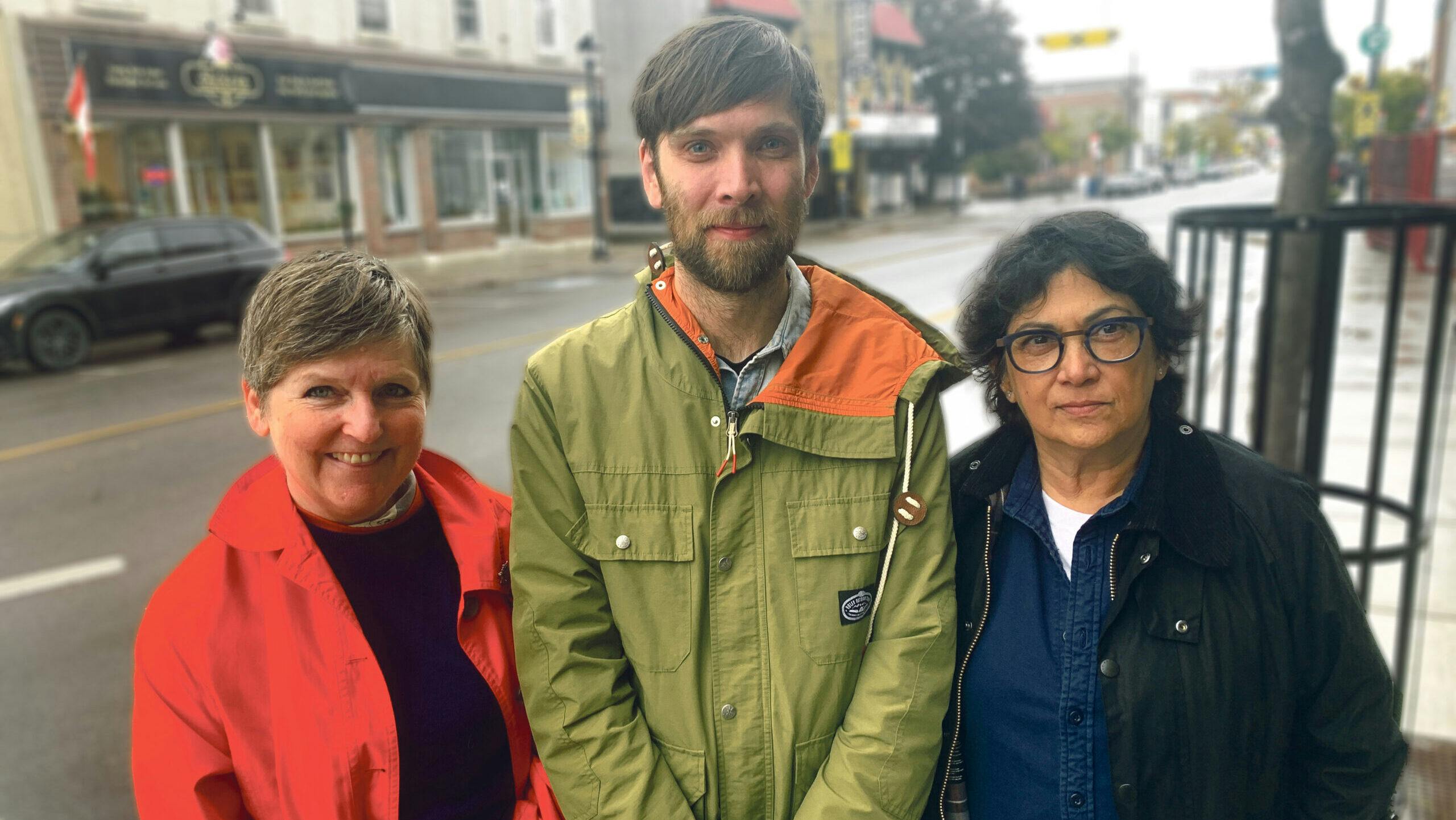 POETS OF PRINCE EDWARD COUNTY: Jane Macdonald, Andrew Faulkner, Shani Mootoo (Jason Parks/Gazette Staff)
POETS OF PRINCE EDWARD COUNTY: Jane Macdonald, Andrew Faulkner, Shani Mootoo (Jason Parks/Gazette Staff)
In ancient Greek mythology the Muses, the goddesses who inspire the arts, were nine, and they lived on Mount Helicon.
On the afternoon of Saturday 14 October the bright new downstairs room of the Picton Public Library, overlooking Mary Street and the treed ravine beyond, recalled the legendary Mount. Nine poets read from their work to a full house of readers, listeners, and thinkers, old and young.
Poet Andrew Faulkner pointed out the window and said, “when the leaves fall for the winter, you can see my house from here.” Maybe our Helicon is not so temporary.
The gathering was called “Lake Effect,” as all of its poets, three from the County and six from Kingston, live on the shores of Lake Ontario. It was organized and hosted by the current Al Purdy A-Frame Poet-in-Residence Kirsteen MacLeod as a part of the her residency.
Some of the poems referred to the lake: Jane MacDonald read “Glenora Ferry.” Others recalled the A-frame. Sadiqa de Meijer related an intricate encounter with a dragonfly while she had been in residence in 2016. As Ms. MacLeod noted, “isn’t that what poetry does? A place that’s familiar—you see it new.”
Many of the poems engaged the intense relationships between parents and children, “delicate disasters,” as Nancy Jo Cullen put it. Ms. MacLeod read some new sonnets, each of which offered a narrative vignette about her aging father, exploring a long relationship hitherto unexamined, taking moments late in life as spots in time representative of a much larger unspoken history.
With wit and power, Sarah Yi-Mei Tsiang explored the intensity of raising a daughter in the modern world, not shying away from its danger and violence. Her poem about a cottage visit had touches of seventeenth-century poets Ben Jonson and Thomas Traherne, but the frank honesty about the violence of children’s emotions was more akin to a contemporary poet like Sharon Olds.
Other themes included cross-cultural encounters. What is the sense of self for an immigrant in a new land or a new language? Y. S. Lee’s piece from her chapbook Exit Permit addressed the mix of anxiety and ambition in a young person navigating a move from Chinese to English. The reading became a duet (assisted by fellow poet Ashley-Elizabeth Best): in print the poem has the young speaker’s thoughts in the left-hand column and, on the right, the voice of a conservative adult, running interference. Quite something in performance.
Well known writer, and long-term County resident, Shani Mootoo, read a new poem, a longer work examining the identity of a Caribbean colonized subject who chooses to emigrate to England, the colonizing country. The poem juxtaposes brown complexioned skin to the bronze and marble of statues celebrating the colonizers. Thomas Picton, “the blood-stained governor of Trinidad,” did not escape notice. Simple repetitions of the outrages of colonial history were very effective.
The poets present were pleased to be together—some old friends, some new. It was a “dream event,” said Ms. Mootoo, “not a festival, just a day in the County.” A running joke concerned misery as the subject of poetry. “I don’t write many happy poems,” said Ms. Cullen; later, Ms. Macdonald introduced one of hers as “another misery poem.” And yet, this was a happy occasion. The reader at home might find such poetry bleak, but the audience to the readings heard the joy in the art, no matter its subject, and the camaraderie and self-awareness of the artists who create it.
Ms. MacLeod confessed to “library envy,” understandable in Picton’s majestic new hall. But it was not just the building. “The staff were so gracious and generous in offering their beautiful space, both for a yoga-and-poetry workshop in the morning, as well as the reading in the afternoon. They were great hosts, providing promotional assistance on social media as well as posters,” she elaborated. “The County is the only place I’ve ever travelled where there are municipal signposts pointing to the nearest library!”
The reading was a part of the A-frame’s program, which preserves the history of poetry by seeding new poets. This kind of continuity was exemplified the day after the reading when Al Purdy’s widow, Eurithe, now 98 years old, paid a surprise visit to the old house, and settled into her old chair at the picture window for a cup of tea. Ms. MacLeod was thrilled.
See it in the newspaper